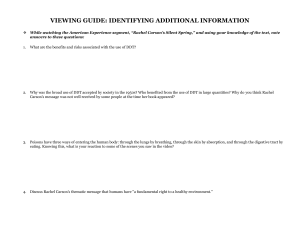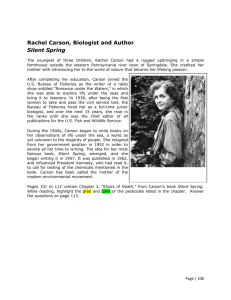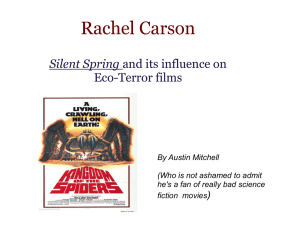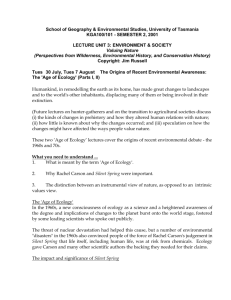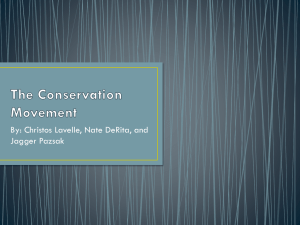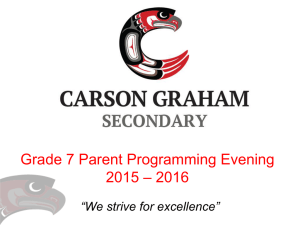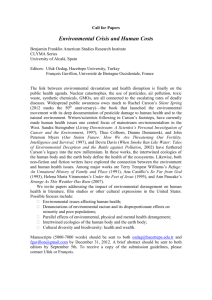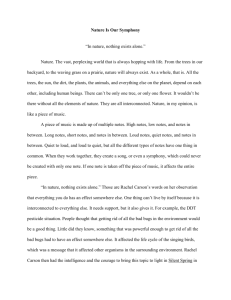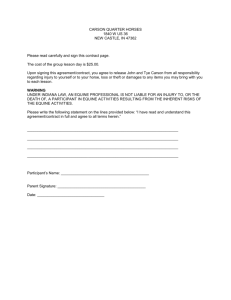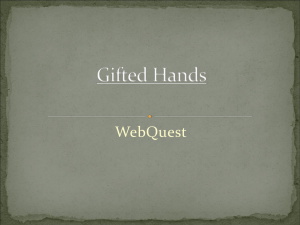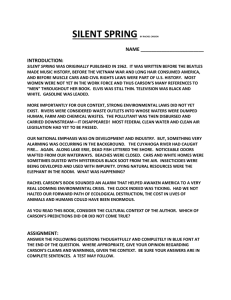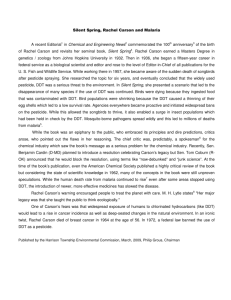STW School Profile 2010 - Virtual Library (CA Dept of Education
advertisement
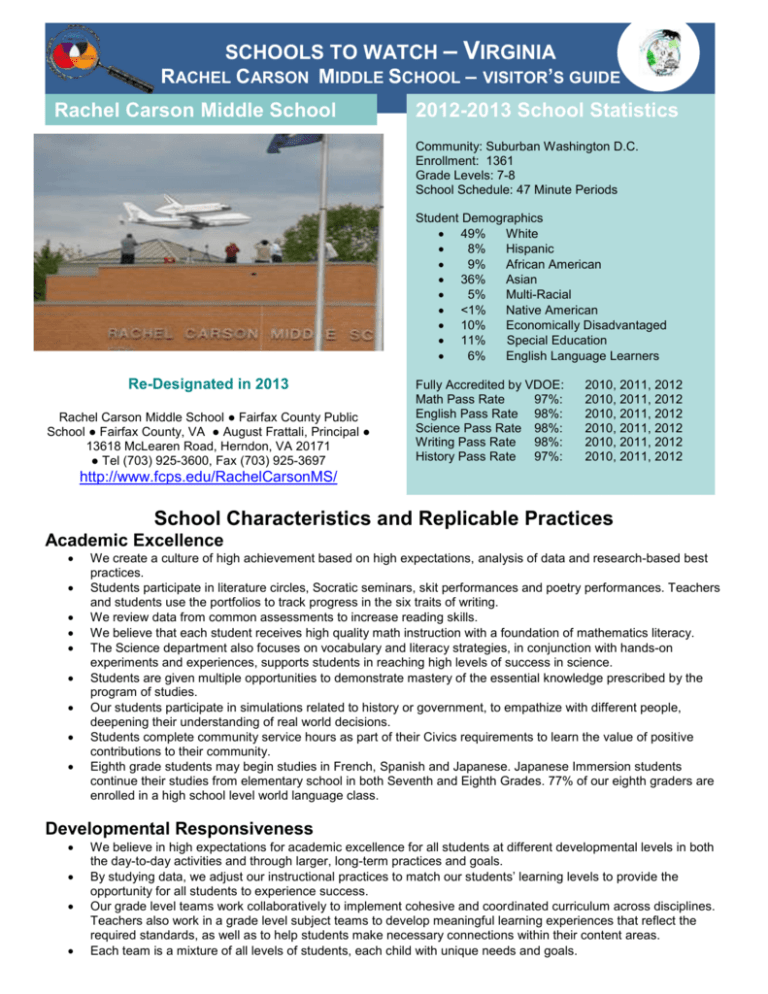
SCHOOLS TO WATCH – VIRGINIA RACHEL CARSON MIDDLE SCHOOL – VISITOR’S GUIDE Rachel Carson Middle School 2012-2013 School Statistics Community: Suburban Washington D.C. Enrollment: 1361 Grade Levels: 7-8 School Schedule: 47 Minute Periods Student Demographics 49% White 8% Hispanic 9% African American 36% Asian 5% Multi-Racial <1% Native American 10% Economically Disadvantaged 11% Special Education 6% English Language Learners Re-Designated in 2013 Rachel Carson Middle School ● Fairfax County Public School ● Fairfax County, VA ● August Frattali, Principal ● 13618 McLearen Road, Herndon, VA 20171 ● Tel (703) 925-3600, Fax (703) 925-3697 Fully Accredited by VDOE: Math Pass Rate 97%: English Pass Rate 98%: Science Pass Rate 98%: Writing Pass Rate 98%: History Pass Rate 97%: 2010, 2011, 2012 2010, 2011, 2012 2010, 2011, 2012 2010, 2011, 2012 2010, 2011, 2012 2010, 2011, 2012 http://www.fcps.edu/RachelCarsonMS/ School Characteristics and Replicable Practices Academic Excellence We create a culture of high achievement based on high expectations, analysis of data and research-based best practices. Students participate in literature circles, Socratic seminars, skit performances and poetry performances. Teachers and students use the portfolios to track progress in the six traits of writing. We review data from common assessments to increase reading skills. We believe that each student receives high quality math instruction with a foundation of mathematics literacy. The Science department also focuses on vocabulary and literacy strategies, in conjunction with hands-on experiments and experiences, supports students in reaching high levels of success in science. Students are given multiple opportunities to demonstrate mastery of the essential knowledge prescribed by the program of studies. Our students participate in simulations related to history or government, to empathize with different people, deepening their understanding of real world decisions. Students complete community service hours as part of their Civics requirements to learn the value of positive contributions to their community. Eighth grade students may begin studies in French, Spanish and Japanese. Japanese Immersion students continue their studies from elementary school in both Seventh and Eighth Grades. 77% of our eighth graders are enrolled in a high school level world language class. Developmental Responsiveness We believe in high expectations for academic excellence for all students at different developmental levels in both the day-to-day activities and through larger, long-term practices and goals. By studying data, we adjust our instructional practices to match our students’ learning levels to provide the opportunity for all students to experience success. Our grade level teams work collaboratively to implement cohesive and coordinated curriculum across disciplines. Teachers also work in a grade level subject teams to develop meaningful learning experiences that reflect the required standards, as well as to help students make necessary connections within their content areas. Each team is a mixture of all levels of students, each child with unique needs and goals. Honors students have opportunities for advanced classes that move at an accelerated pace and include enrichment for many concepts. Each student is supported in personal growth in a robust after school program that results in ownership and belonging. Our technology program is intended to be ubiquitous. All students are invited to bring their own electronic devices to school for instructional use in our classrooms. Every classroom has a SMARTboard and projector with support for each teacher to engage our students in their learning and model research and learning supports as standards are explored. Each team has a mobile lab of computers that is used in various disciplines every day. The sense of community is an integral part of Carson and a driving force behind the school’s success. Students are encouraged to help their peers and community. Our 8th Graders complete Service Hours each quarter for Civics class. Social Equity Our student population continues to grow in diversity and in number. This diversity can be defined in many ways including culturally, socio-economically and learning program enrollment. Minority enrollment (African American, Asian, Latino/Hispanic, Native American) has increased to a little more than half that of the total student population. Support is provided for each learner by individualizing instruction and best practices based on data provided by a variety of formats. We integrated Saturday School, Pathways and afterschool assistance into one program title: Extended Learning Opportunity (ELO). This program was open to anyone who had work to complete. It was organized and administered by teachers and administrators with the help of peer tutors. The Special Education program offers a wide variety of services to students with exceptional needs. Following a strong philosophy of inclusive practices, students are supported in co-taught classes or in small, special education classes in each of the four core subjects. Students identified as “twice exceptional” often will participate in the Advanced Academic programs and are monitored by resource teachers. The ACCE, Accessing Common Curriculum for Everyone, model is accessed, when appropriate, by students in our Autism and Intellectual Disabilities programs. We are striving to define differentiation, refine best practices, and combine all the skills that these professionals and our students have to offer in order to truly pursue our full potential. Organizational Support Administrators and department chairs lead the debriefing of the previous school year, analyze data and set goals in the early spring and summer. These SMART goals are prioritized and drive the decisions about the school program for the following school year. Goals focus on student achievement through hiring, master scheduling, and planning staff development opportunities. Each new staff member is assigned a teacher mentor and is creatively introduced and provided the necessary support to experience success. The master schedule is created keeping a few non-negotiable items in mind such as common planning for teams and departments and lower enrollment numbers for at-risk students. The leadership team, with representation from the administration, interdisciplinary teams, departments, and teacher leaders, meets monthly to review policy issues and share in the decision making process. Special education resource teachers support differentiation and teaming practices, monitor special education students enrolled in honor classes, and support behavior plans for at-risk students. Each teacher meets at least twice per week with the other members of their grade-level department as a Collaborative Learning Team to work on curriculum, analyze data and make instructional decisions. The opening week of school is designed to model the ways that each member of the Rachel Carson Middle School family can translate the school philosophy into data driven best practices. The practices we exhibit result in a nurturing environment that promotes academic and personal excellence for all of our students. All parents receive progress reports every several weeks from each of their child’s teachers, so that they can support their children in their learning and achievement Each teacher has a Blackboard site to communicate homework assignments, tests, upcoming projects (short term and long term), and relay other important school information to the students and the parents. A structured 19-minute block of time during each school day supports students with essential components to be a successful student. A strong after-school program enriches and extends the core curriculum. RCMS maintains strong ties to our community through our Business Partnerships with Scitor Corporation and Northwest Federal Credit Union. Each business works directly with the school in a variety of ways in order to support our vision of academic and personal excellence for all students. A myriad of support structures are in place for underachieving students: o Mentor Program o Extended Learning Opportunity (ELO) o Individual Learning Plans for cusp students – students scoring below 425 in previous math and reading SOL assessments o Resource Classes including Read 180, Reading and Writing Semester Electives, Learning Seminar Mathematics Support, Algebra Readiness Initiative
